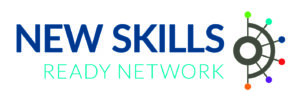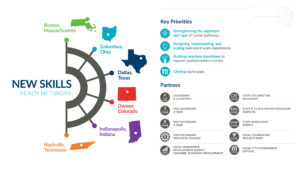This week House Career Technical Education (CTE) Caucus co-chairs began circulating a Dear Colleague letter aimed at securing robust funding for the Carl D. Perkins Career and Technical Education Act (Perkins V). In addition, federal agencies unveiled equity action plans outlining planned efforts to advance equity throughout the federal government.
FY23 Perkins V Funding Letter Being Circulated for Sign-on
 It has been quiet on Capitol Hill this week, with lawmakers in both chambers currently in states and districts for the annual springtime Congressional recess. Both the House and the Senate are expected to return later this month during the week of April 25. With the release of President Biden’s federal fiscal year 2023 (FY23) budget request to Congress earlier this month, it is widely anticipated that lawmakers will focus attention on the FY23 budget and appropriations cycle when they return.
It has been quiet on Capitol Hill this week, with lawmakers in both chambers currently in states and districts for the annual springtime Congressional recess. Both the House and the Senate are expected to return later this month during the week of April 25. With the release of President Biden’s federal fiscal year 2023 (FY23) budget request to Congress earlier this month, it is widely anticipated that lawmakers will focus attention on the FY23 budget and appropriations cycle when they return.
Ahead of these efforts, House CTE Caucus co-chairs Reps. Jim Langevin (D-RI) and Glenn “GT” Thompson (R-PA) are leading a “Dear Colleague” letter to be sent to the leadership of the House Appropriations Committee’s Labor, Health and Human Services, and Education Subcommittees. The letter requests robust funding for Perkins V in the House’s forthcoming FY23 appropriations bill. This letter is an important way for members to gauge support for programs like the Perkins basic state grant program as they make critical funding decisions for how to allocate finite federal resources as part of this process.
While the President’s FY23 request was disappointing, Advance CTE and its partners are working with Congress to ensure Perkins V is provided the funding necessary to ensure access to all learners have access to high-quality Career Technical Education (CTE) programs. We are therefore encouraging you to get in touch with your members of Congress and ask them to sign-on to this important Dear Colleague letter. To do so, click here!
Biden Administration Unveils Equity Agendas
On Thursday, April 14, federal departments and agencies collectively released “Equity Action Plans”. These plans are part of President Biden’s January 20, 2021 executive order aimed at advancing equity and support for underserved communities throughout the federal government. As part of these efforts, the U.S. Department of Education (ED) also unveiled its specific equity action plan which broadly aims to undertake work in five main areas:
- Prioritizing access to and completion of an education beyond high school;
- Ensuring equitable impact of American Rescue Plan’s $130 billion in funding for K-12 students;
- Investing in resources to help advance civil rights;
- Advancing equity in contracting and procurement; and
- Advancing equity in grant process strategies.
The full plan can be found here.
Encourage Lawmakers to Join CTE Caucuses
In conjunction with the House and Senate CTE Caucuses, Advance CTE and ACTE are working to encourage Senators and Representatives over the next several weeks to join their respective CTE Caucuses, if they have not done so already. To find out if your Members of Congress have joined their respective Caucus, you can review House and Senate membership lists. Membership in these caucuses is an important way for lawmakers to signal their support for CTE and the millions of learners across the country who enroll in these programs. To encourage your Senator or member of Congress to join, click here and scroll down to the request form corresponding to your needs.
Steve Voytek, Policy Advisor


 Now that we are nearing the end of the first two-years of the CLNA and as states begin to ramp up their second process, Advance CTE and the Association for Career and Technical Education (ACTE) interviewed state and local Career Technical Education (CTE) leaders to identify exemplar states and their journey through implementation.
Now that we are nearing the end of the first two-years of the CLNA and as states begin to ramp up their second process, Advance CTE and the Association for Career and Technical Education (ACTE) interviewed state and local Career Technical Education (CTE) leaders to identify exemplar states and their journey through implementation.  Advance CTE welcomes Nithya Govindasamy as a Senior Advisor. Nithya leads and manages major organization-wide, highly visible initiatives that support, promote and increase equitable access to and success in high-quality Career Technical Education (CTE), which includes: workforce development, education and equity initiatives; technical assistance for
Advance CTE welcomes Nithya Govindasamy as a Senior Advisor. Nithya leads and manages major organization-wide, highly visible initiatives that support, promote and increase equitable access to and success in high-quality Career Technical Education (CTE), which includes: workforce development, education and equity initiatives; technical assistance for 
 In April 2021, Advance CTE released
In April 2021, Advance CTE released  With a focus on recruitment and retention, it is important for learners and families of CTE to see success stories of individuals who look like them and share similar educational, racial, socio-economic, gender and geographic backgrounds.
With a focus on recruitment and retention, it is important for learners and families of CTE to see success stories of individuals who look like them and share similar educational, racial, socio-economic, gender and geographic backgrounds. Families and learners both participating in and considering CTE highly value an education experience that allows learners to explore opportunities after high school that lead to college and career success. In this example, Utah used graphics of learners engaging in real-world skills training to promote its Auto Mechanics and Repairs career pathway. This is a way of demonstrating the connection from CTE courses, work-based learning settings and youth apprenticeship programs to career success.
Families and learners both participating in and considering CTE highly value an education experience that allows learners to explore opportunities after high school that lead to college and career success. In this example, Utah used graphics of learners engaging in real-world skills training to promote its Auto Mechanics and Repairs career pathway. This is a way of demonstrating the connection from CTE courses, work-based learning settings and youth apprenticeship programs to career success. Using local examples can help explain the nuts and bolts of how CTE delivers success by making the connection between CTE and a specific career or industry, as well as highlighting partnerships with local colleges and employers that are recognizable to parents/guardians and learners.
Using local examples can help explain the nuts and bolts of how CTE delivers success by making the connection between CTE and a specific career or industry, as well as highlighting partnerships with local colleges and employers that are recognizable to parents/guardians and learners. Wisconsin CTE showcased CTE to parents/guardians and learners by lifting up student success stories. One avenue to find compelling learner examples is to coordinate with statewide or local Career Technical Student Organizations (CTSOs) and gather testimonials, photos and stories to share on social media. This tweet focused on a local learner success story to create human interest in CTE. To help expand the reach of this tweet, Wisconsin CTE used relevant hashtags and tagged the state CTSO and the university the learner was attending. This type of post is a great way to highlight CTE and the many ways CTE benefits learners.
Wisconsin CTE showcased CTE to parents/guardians and learners by lifting up student success stories. One avenue to find compelling learner examples is to coordinate with statewide or local Career Technical Student Organizations (CTSOs) and gather testimonials, photos and stories to share on social media. This tweet focused on a local learner success story to create human interest in CTE. To help expand the reach of this tweet, Wisconsin CTE used relevant hashtags and tagged the state CTSO and the university the learner was attending. This type of post is a great way to highlight CTE and the many ways CTE benefits learners.  Today, Advance CTE and Education Strategy Group (ESG) released an
Today, Advance CTE and Education Strategy Group (ESG) released an 
 Additionally, 80 percent of families participating in CTE are satisfied with opportunities to jumpstart their postsecondary education in high school through opportunities to earn college credit and take advanced classes compared to just 60 percent of families not participating in CTE.
Additionally, 80 percent of families participating in CTE are satisfied with opportunities to jumpstart their postsecondary education in high school through opportunities to earn college credit and take advanced classes compared to just 60 percent of families not participating in CTE.
